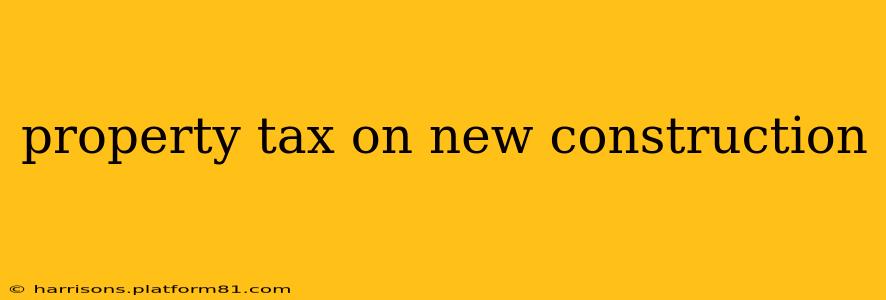Buying a newly constructed home is a significant milestone, but understanding the property tax implications is crucial. This guide unravels the complexities of property taxes on new construction, offering clarity and insights to navigate this often confusing aspect of homeownership. We'll address common questions and provide a comprehensive overview to empower you with the knowledge you need.
How is Property Tax on New Construction Calculated?
Property taxes are typically calculated based on the assessed value of your property. For new construction, this assessment usually happens after the home's completion and inspection. The local tax assessor's office will assign a value based on comparable properties in the area, considering factors like size, location, features, and the current market conditions. This assessed value is then multiplied by the local property tax rate, resulting in your annual property tax liability. It's important to note that the tax rate varies significantly depending on your location. Some municipalities may have a higher rate than others, and this rate is determined by local government budgets and spending plans.
When Do I Start Paying Property Taxes on My New Construction?
You generally begin paying property taxes once the property's assessed value is finalized. This usually occurs after the completion of construction and the issuance of a certificate of occupancy. This means that you won't be paying property taxes during the construction phase itself. However, it's vital to be aware of this upcoming expense as you plan your budget for homeownership. Your first tax bill may arrive soon after the completion of construction, or it may be included in your first mortgage payment. Confirm this directly with your mortgage lender and the local tax assessor's office to avoid any surprises.
What are the Tax Implications of Building a Home vs. Buying an Existing Home?
The tax implications are similar in many respects, but there are some key differences. Building a home often gives you more control over the features and finishes, which might impact the final assessed value and thus your property taxes. In contrast, buying an existing home means you inherit the existing tax assessment, though this assessment may be subject to reevaluation after you purchase the property. It is vital to consider both the initial purchase price and the potential future property tax burden for both options.
How Do Property Tax Exemptions Affect New Construction?
Some jurisdictions offer property tax exemptions or abatements for new construction, aiming to stimulate development and homeownership. These exemptions can significantly lower your property tax burden for a specific period, sometimes even for several years. However, the availability and specifics of such exemptions differ widely across regions. You should contact your local tax assessor's office to find out if such programs are available in your area and determine if your property qualifies.
Can I Appeal My Property Tax Assessment on New Construction?
Yes, if you believe the assessed value of your new home is unfairly high compared to similar properties, you can generally appeal the assessment. This process involves providing evidence and documentation to support your claim. The appeal process and required documentation vary depending on your local jurisdiction, so you'll need to understand the specific regulations of your area. Thoroughly researching the process and gathering strong evidence are critical for a successful appeal.
What Factors Influence Property Tax on New Construction?
Several key factors influence property tax on new construction, including:
- Location: Property values and tax rates vary significantly based on location. Properties in prime areas typically command higher assessments and taxes.
- Size and Features: Larger homes with high-end finishes will typically have higher assessed values and, consequently, higher property taxes.
- Market Conditions: Fluctuations in the real estate market affect property values, impacting the tax assessment. A booming market may lead to higher assessments.
- Local Government Budget: The budget of your local government significantly influences the property tax rate.
Understanding these factors can provide a more accurate estimation of your property tax liability before committing to a purchase.
This comprehensive guide offers a clear overview of property taxes on new construction. Remember to always consult your local tax assessor's office and relevant professionals for personalized advice tailored to your specific situation and location. Accurate information will help you manage your finances effectively and enjoy your new home without unexpected tax surprises.
